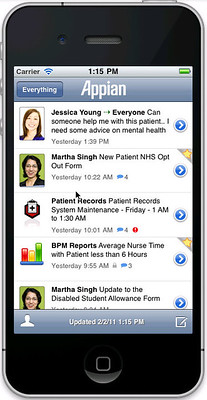Matt Calkins, CEO of Appian, provided us with some vision around how BPM is changing, and how Appian is delivering on that. They’ve experienced significant growth in sales in the past year, and more than 40% of their business is on their cloud platform.
Their big news, of course, is Tempo: their process event streaming interface that integrates closely with their BPM platform as an alternative interface, and also allows inclusion of events from a variety of sources such as Salesforce.com or pretty much anything with an RSS feed. There are two significant things going on here: one is the ease of use of the interface, and the other is the enablement of mobile. This fundamentally changes how work can get done; I spoke with an Appian customer last night (who will be presenting later today on a panel) about how they will be using Tempo to enable fuel tank inspection operators to update a Tempo-based compliance checklist on their mobile device instead of using paper clipboards, then having to spend additional time back at an office filling out a spreadsheet and emailing it to someone. As we know, in regulated industries, it’s not enough to be compliant, you have to be seen to be compliant; providing this sort of immediate update of compliance data helps with the latter at the same time as you’re doing the former.
In their latest release happening now, you can brand your own application based on Tempo, so that the iPhone app uses your logo and title bar rather than being branded as Appian.
 He poked a bit of fun at how some other vendors are presenting their social business offerings as more about social interaction than getting business done: social may be the delivery mechanism, but the payload is business. Their social platform is focused on integration so that you don’t have your interaction in one system, then login to the “real” system to record what happened; integrating with their own process management plus many other systems means that Tempo is the real system, just an alternative, cooler interface to it.
He poked a bit of fun at how some other vendors are presenting their social business offerings as more about social interaction than getting business done: social may be the delivery mechanism, but the payload is business. Their social platform is focused on integration so that you don’t have your interaction in one system, then login to the “real” system to record what happened; integrating with their own process management plus many other systems means that Tempo is the real system, just an alternative, cooler interface to it.
He moved on to talk about the nature of work, that is, the spectrum between structured and ad hoc work, especially within the same process. I’ve talked a lot about this requirement to have completely unstructured portions within a structured process, and see it in almost every business process that I work on with enterprise clients. He sees this as something that is handled by social business; I see a distinction between dynamic and social, although there’s a correlation.
He did a good overview of the type of people in enterprise today relative to their mobile usage: executives (approvals, reports), headquarters workers (keep in touch), road warriors (initiate tasks, remote collaboration) and mobile task workers (execute tasks, access data). Enterprise applications provide varying levels of support for current business functions, by providing modern interfaces, making business events visible, having native mobile processes and data, and integrating social functionality. For those applications that don’t provide some of the more advanced levels of support, Appian is providing ways to add Tempo as an interface to bring them up to scratch. He sees BPM in 2013 as being focused on the mobile process enterprise: it’s more than just having organizations become process enterprises (which is enough a challenge on its own), but that these processes can be accessed from anywhere. Ambitious, but not undoable.
